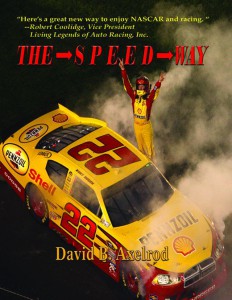
For Richer Or For Poorer
man could do was pick dead fish
off the beach before the races.
Vanderbilt brought a beast
of a Mercedes that could do 92.
Later, he’d put $6 million into
paving the Vanderbilt Motor Parkway
to speed him from NYC, 45 miles
out on Long Island. In 1910,
Rockefeller, for all his Standard
Oil, loved watching Barney
Oldfield gassing up his Benz
to hit a record 131. Handsome
young men of daring could
do little without the money
to buy $6,000 worth of tires —
the price of 4 race treads,
even in the Depression. When
he came to town in the ’30s,
a guy like Bill France was
the opposite of a fat cat. He didn’t
have a dime enough to call
a sponsor and ask for money —
just fiddled with cars, opened
the throttle and let loose,
paving the way for generations
of working stiffs to not just watch
but enter their cars. Take Russ
Truelove, a heartthrob on
the track in the mid ’50s, out
there in his souped-up Mercury.
He could run flat out for a $5,000
purse, tearing up the beach, racing
north toward Junkyard Turn,
then south on A1A toward fame
and that small fortune. Fast cars,
at last, were for any good man’s
pleasure. “If we were lucky,”
Truelove waxed poetic, “we’d
hear the faint whisper of the surf,”
a siren’s call to speed as we
risked it all racing along
the beach. Later, he admitted
a driver couldn’t hear a thing
over the roar of the engine.
(For more by David Axelrod go to www.totalrecallpress.com or www.amazon.com.)
